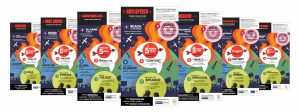A 5 Point Test for Hate Speech in Media
The Ethical Journalism Network’s 5-point test for hate speech has been developed to assist journalists and editors to identify speech that is deliberately designed to incite hatred. The full text of the test, video and an infographic explaining it (available in 30 languages) are available here.
ONE: The position or status of the speaker
Journalists and editors must understand that just because someone says something outrageous that does not make it news. Journalists have to examine the context in which it is said and the status and reputation of who is saying it. A rabble-rousing politician who is adept in manipulating an audience should not get media coverage without questioning the substance of what is being said. Good journalists report in context; they test claims and opinions against the facts and they are wary of unsubstantiated and controversial comments that may do harm to others.
TWO: The reach of the speech
A private conversation in a public place can include the most unspeakable opinions but do relatively little harm, but that changes if the speech is disseminated through mainstream media or the Internet. Journalists have to consider the frequency and extent of the communication – is it a short momentary, intemperate burst of invective and hatred, or is it repeated deliberately and continuously? Answering the question of the newsworthiness and intention may be helped by considering if there is a pattern of behaviour or if it is a one-time incident.
THREE: The objectives of the speech
Journalists and editors have a special responsibility to place the speech in its proper context – to disclose and report what are the objectives of the speaker. It is not our intention to deliberately expose or diminish people with whom we disagree, but careful, ethical reporting always helps people better understand the context in which speech is made. The key questions to ask are: What does it benefit the speaker and the interests that he or she represents? Who are victims of the speech and what is the impact upon them, both as individuals and within their community?
FOUR: The content and form of speech
Journalists have to judge whether the speech is provocative and direct, in what form it is made, and the style in which it is delivered. Lots of people have offensive ideas and opinions. That’s not a crime, and it’s not a crime to make these opinions public but the words and images they use can be devastating if they incite others to violence. Journalists ask themselves: is this speech or expression dangerous? Could it lead to prosecution under the law? Will it incite violence or promote an intensification of hatred towards others?
FIVE: The economic, social and political climate
Speech that is dangerous or controversial arises particularly when times are hard, social tensions are acute and politicians are at war with one another. Journalists must take into account the public atmosphere at the time the speech is being made. The heat of an election campaign when political groups are challenging each other and jostling for public attention often provides the background for inflammatory comments. Journalists have to judge whether expression is fair, fact-based and reasonable in the circumstances.
